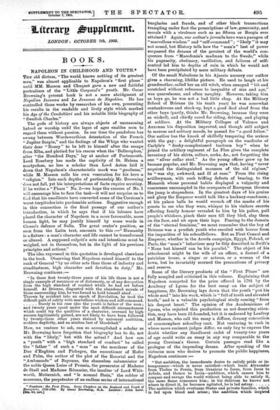• does not fall, yet his interpretations of facts require
scrutiny.
If he writes a " Phase " No. 2—we hope the success of No. 1 will encourage him to face the task—it will not surprise us to find that his emollients have converted some of the Corsican's worst turpitudes into pardonable actions. Suggestive enough in this connection is the final passage of our author's introduction, in which he says that if his labours have - placed the character of Napoleon in a more favourable, more human light, he may justify himself by some words in Cicero's defence of Sulla. The great orator's position, as seen from the Latin text, amounts to this :—" Humanity is a fixture : a man's character and life cannot be transformed or altered. A supposed culprit's acts and intentions must be
weighed, not in themselves, but in the light of his previous principles and actions."
The idea expressed in this quotation is developed elsewhere in the book. Observing that Napoleon raised himself to the rank of General "by no other acts than those of industry and steadfastness, high character and devotion to duty," Mr. Browning continues :—
"In these first twenty-three years of his life there is not a single example of meanness or of dishonesty, or of any derogation from the high standard of conduct which he had set before himself. At Brienne, disgusted with the abandoned morals of those surrounding him, he was forced to hold himself aloof Thrown by accident into an epoch of Revolution, he trod the difficult path of safety with marvellous wisdom and self-command.


























































 Previous page
Previous page